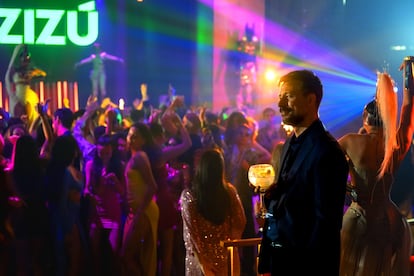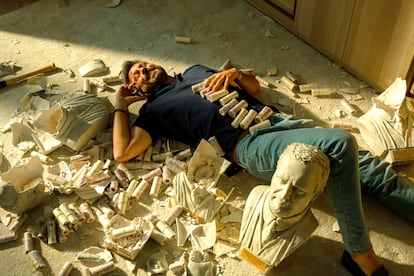Outside the media spotlight, a hundred criminal groups coexist on the Costa del Sol. It is a kind of large logistics centre where mafias from all over the world rub shoulders, in balance. In April 2021, journalists Nacho Carretero and Arturo Lezcano published an extensive report in EL PAÍS that shed light on this peculiar universe based in Marbella. Their objective was to show the complete picture of this “UN of mobsters”, as a police chief says in the article.
The same Sunday it was published, Dani de la Torre and Alberto Marini, who at the time were finishing the second season of Unit (finally, there was another installment set in Afghanistan), they were looking for a topic for their next project, “a story of social impact that was rarely told and that would allow for the construction of a human drama,” recalls Marini. Before finishing reading it, they exchanged messages: there they had the topic they were looking for. “The same day, I received a message from Movistar Plus+ asking if we had read it,” recalls De la Torre. And in parallel, the journalists also went to Telefónica television to suggest the possibility of a series based on their story. EL PAÍS brings together the two journalists and the two creators to talk about Marbella city and Marbella series, which the platform will premiere on Thursday, May 2.
Dani de la Torre, co-creator with Marini of the fiction and who directed the six episodes with Oskar Santos, had more to do with Marbella beautiful people from the eighties, arms dealers (universe that the series collects The Farads) and the era of Jesús Gil. Something from the past. “But seeing that all the mafias now have a headquarters there, as if they were franchises, blew my mind,” he said last week.
The collaboration between journalists and creators was absolute in the construction of the series. The script, written by Alberto Marini, was built with the help of the information and journalistic analysis provided by Carretero and Lezcano. “Our role here is to be the reality bearers,” Lezcano sums up. “The series had to fulfil the objective of every series, which is to entertain and please, but also to be educational. It puts the camera in those levels of invisibility that are intolerable in many cases, but which a country has tolerated for a long time,” adds Carretero.
In order to tell this reality, you had to see it. That’s why the four of them traveled to Marbella. There, they immersed themselves in a world of excess and ostentation, of discos, nightclubs, owners of high-end cars, prostitution… “I’ve never felt so embarrassed in my life,” says De la Torre. “A champagne that costs I don’t know how much money, girls who go out of their way to sit at a table… These are things that make me uncomfortable. Even the comments between them, or getting out of a high-end car in bright green. There’s something that makes you hate it,” adds De la Torre. The reference for The wolf of Wall Street It is a recurring theme throughout the conversation. “When we see Scorsese’s most mischievous films, we think that this cannot be done in Spain because there are no such characters, but in Marbella there are,” he says.

It was not difficult to get criminals from different gangs to sit down and talk to them: it was difficult to reach them but not to get them to talk. Even real mafia members were offered extras for the production, but they preferred to reject them. “People from the mafia have everything, but the only thing they don’t have is notoriety. They like to tell it. You can’t put their real names, but they tell you what they’ve done and they, in fact, are the ones who … small committeethey then say ‘that’s me’,” says De la Torre.
The four of them explored the hidden side of Marbella. “A detail that happened to us one of the first times we went. In a restaurant, we asked for the payment terminal to pay, and the waiter told us he didn’t know how to use it. They pay everything in cash. Or that in clothing stores there are machines to count bills. Or that in a dealership you can pay in cash,” says Nacho Carretero.
The series captures the way the mafias interact on the Costa del Sol, as well as the Marbella nightlife. The protagonist, a lawyer who has these criminals among his clients, moves in this world, played by Hugo Silva. Like everything in fiction, his character is also inspired by real lawyers, but taken to the extreme: he crosses a line that is not crossed in reality. “We wanted to follow this man and for him to show us this world. He is a detestable guy, but we didn’t want him to generate so much hatred that you wouldn’t want to see where he is going,” describes De la Torre.
With all these ingredients, Marbella It ends up being, in reality, a gangster series, a genre rarely addressed in Spanish audiovisuals. “To do something like The Wolf of Wall Street, One of Ours either casinoyou have to go to the underworld, to the sordid, the dark. But in people with money, I have only seen that in Marbella with this level of disproportion,” says De la Torre. For him, the absence of this genre in Spanish fiction responds to several factors. “The budgets before the platforms did not allow for large expenditures on staging. As stories have been told, even if they are small, in the style of Prince either Without tits there is no paradise“People have become more encouraged,” he reflects.

Nacho Carretero continues: “In Spain we need to relax our complexes. We are fascinated by foreign issues, such as the Italian mafia, Gomorrah and such. But what are we doing looking outside if we have a singularity like Marbella, a unique phenomenon? We Spaniards find it very difficult to show our miseries. In Italy they have been making social films for decades and exposing their miseries in the form of mafias. The same with the Anglo-Saxons and not to mention the French. There is a generational change, and not only in age, but also in mentality, that thinks, ‘hey, we have our miseries and some are fascinating and juicy for the audiovisual and culture to enter there’, defends the journalist. “Denying that Marbella is one of the capitals of organized crime is like denying that there has been a mafia in Sicily or cartels in Colombia. We have to get rid of the complex, assume that we have a problem, face it and tell it. Gangster stories fascinate us, we have seen the Italians, the Americans, but the mafia here has its own rules. They shoot in impossible tracksuits. It’s a silly example, but it’s a mafia that has no references in other mafias at the audiovisual level,” adds Marini.
Although this reality is there, Marbella, as the report reflects and is shown in the series, is a safe place. “We portray a reality that is very violent, with very extreme codes, but they are not codes that affect the safety of the city or tourists,” says Carretero. “There are many residents who are fed up with nothing being done and there being impunity. There are no means or interest to stop this,” he adds. The presence of organised crime on the Costa del Sol does not cause social alarm nor does it penalise politically, reflects De la Torre. And Carretero adds: “In addition, they bring in a lot of money. Perhaps in the series we are putting on the table the answers to why nothing is being done.”

The investigation by Carretero and Lezcano began in the summer of 2020 and the report was published in April 2021. Has the situation changed since then? “It has changed for the worse,” says Carretero, emphatically. “The security forces are in their infancy because they are not given the means, the police are poorly paid and are not capable of stopping a massive presence of organised crime. This is a political responsibility, not a police one. The police are tired of asking for help, of seeing that the computer does not turn on or that they have to take a photo with their mobile phone because they do not have a camera,” he continues. “If you look at the news from so far this year about Marbella, you see again those points that apparently have no connection but many do. It is a constant trickle,” adds Arturo Lezcano. “A few weeks ago, two civil guards were killed because they were in a five-metre zodiac and they ran over them. And nobody has resigned. Nothing says that this is going to stop. In other countries, journalists and police officers are being killed. Why do we think that this will not happen in Spain? Of course, if things continue like this, it will happen,” Carretero concludes.
You can follow EL PAÍS Television on X or sign up here to receive our weekly newsletter.



